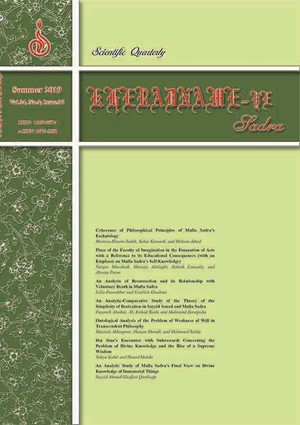-
-
List of Articles
-
Open Access Article
1 - Ibn Sina’s Encounter with Suhrawardi Concerning the Problem of Divine Knowledge and the Rise of a Supreme Wisdom
Yahya Kabir Hamid Maleki -
Open Access Article
2 - Coherence of Philosophical Principles of Mulla Sadra’s Eschatology
Morteza Hoseinzadeh Sahar Kavandi Mohsen Jahed -
Open Access Article
3 - Ontological Analysis of the Problem of Weakness of Will in Transcendent Philosophy
Akbar pour Marzieh Hassan Moradi mahmoud saidi -
Open Access Article
4 - An Analysis of Resurrection and its Relationship with Voluntary Death in Mulla Sadra
leila pourakbar Einollah Khademi -
Open Access Article
5 - Editor's Notes
Seyyed Mohammad Khamenei -
Open Access Article
6 - Place of the Faculty of Imagination in the Emanation of Acts with a Reference to its Educational Consequences (with an Emphasis on Mulla Sadra’s Self-Knowledge)
Narges Movahedi Marzieh akhlaghi zohre Esmaiyli Alireza Parsa -
Open Access Article
7 - An Analytic-Comparative Study of the Theory of the Simplicity of Derivation in Sayyid Sanad and Mulla Sadra
Fatemeh Abedini Ali Arshad Riahi Mahmud Zeraatpishe -
Open Access Article
8 - An Analytic Study of Mulla Sadra’s Final View on Divine Knowledge of Immaterial Things
Seyyed Ahmad Ghaffari Qarabagh -
Open Access Article
9 - 29th Mulla sadra confreres on Iranian Wisdom and hikmat motaaliah
Seyyed Mohammad Khamenei
-
The rights to this website are owned by the Raimag Press Management System.
Copyright © 2017-2026







